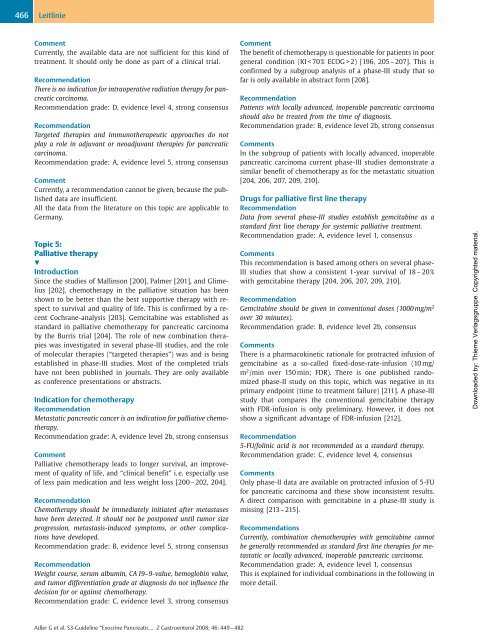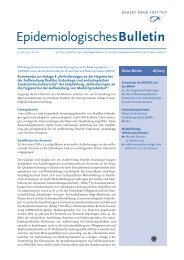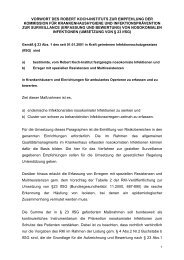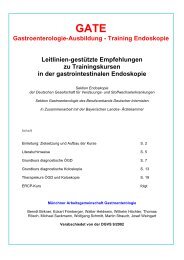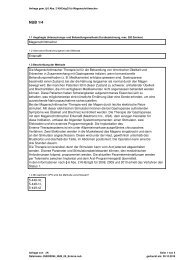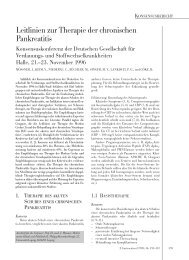S3-Guideline “Exocrine Pancreatic Carcinoma” 20071 ... - DGVS
S3-Guideline “Exocrine Pancreatic Carcinoma” 20071 ... - DGVS
S3-Guideline “Exocrine Pancreatic Carcinoma” 20071 ... - DGVS
You also want an ePaper? Increase the reach of your titles
YUMPU automatically turns print PDFs into web optimized ePapers that Google loves.
466<br />
Leitlinie<br />
Comment<br />
Currently, the available data are not sufficient for this kind of<br />
treatment. It should only be done as part of a clinical trial.<br />
Recommendation<br />
There is no indication for intraoperative radiation therapy for pancreatic<br />
carcinoma.<br />
Recommendation grade: D, evidence level 4, strong consensus<br />
Recommendation<br />
Targeted therapies and immunotherapeutic approaches do not<br />
play a role in adjuvant or neoadjuvant therapies for pancreatic<br />
carcinoma.<br />
Recommendation grade: A, evidence level 5, strong consensus<br />
Comment<br />
Currently, a recommendation cannot be given, because the published<br />
data are insufficient.<br />
All the data from the literature on this topic are applicable to<br />
Germany.<br />
Topic 5:<br />
Palliative therapy<br />
!<br />
Introduction<br />
Since the studies of Mallinson [200], Palmer [201], and Glimelius<br />
[202], chemotherapy in the palliative situation has been<br />
shown to be better than the best supportive therapy with respect<br />
to survival and quality of life. This is confirmed by a recent<br />
Cochrane-analysis [203]. Gemcitabine was established as<br />
standard in palliative chemotherapy for pancreatic carcinoma<br />
by the Burris trial [204]. The role of new combination therapies<br />
was investigated in several phase-III studies, and the role<br />
of molecular therapies (“targeted therapies”) was and is being<br />
established in phase-III studies. Most of the completed trials<br />
have not been published in journals. They are only available<br />
as conference presentations or abstracts.<br />
Indication for chemotherapy<br />
Recommendation<br />
Metastatic pancreatic cancer is an indication for palliative chemotherapy.<br />
Recommendation grade: A, evidence level 2b, strong consensus<br />
Comment<br />
Palliative chemotherapy leads to longer survival, an improvement<br />
of quality of life, and “clinical benefit” i. e. especially use<br />
of less pain medication and less weight loss [200–202, 204].<br />
Recommendation<br />
Chemotherapy should be immediately initiated after metastases<br />
have been detected. It should not be postponed until tumor size<br />
progression, metastasis-induced symptoms, or other complications<br />
have developed.<br />
Recommendation grade: B, evidence level 5, strong consensus<br />
Recommendation<br />
Weight course, serum albumin, CA 19–9-value, hemoglobin value,<br />
and tumor differentiation grade at diagnosis do not influence the<br />
decision for or against chemotherapy.<br />
Recommendation grade: C, evidence level 3, strong consensus<br />
Adler G et al. <strong>S3</strong>-<strong>Guideline</strong> <strong>“Exocrine</strong> <strong>Pancreatic</strong>… Z Gastroenterol 2008; 46: 449–482<br />
Comment<br />
The benefit of chemotherapy is questionable for patients in poor<br />
general condition (KI < 70% ECOG > 2) [196, 205 –207]. This is<br />
confirmed by a subgroup analysis of a phase-III study that so<br />
far is only available in abstract form [208].<br />
Recommendation<br />
Patients with locally advanced, inoperable pancreatic carcinoma<br />
should also be treated from the time of diagnosis.<br />
Recommendation grade: B, evidence level 2b, strong consensus<br />
Comments<br />
In the subgroup of patients with locally advanced, inoperable<br />
pancreatic carcinoma current phase-III studies demonstrate a<br />
similar benefit of chemotherapy as for the metastatic situation<br />
[204, 206, 207, 209, 210].<br />
Drugs for palliative first line therapy<br />
Recommendation<br />
Data from several phase-III studies establish gemcitabine as a<br />
standard first line therapy for systemic palliative treatment.<br />
Recommendation grade: A, evidence level 1, consensus<br />
Comments<br />
This recommendation is based among others on several phase-<br />
III studies that show a consistent 1-year survival of 18 – 20%<br />
with gemcitabine therapy [204, 206, 207, 209, 210].<br />
Recommendation<br />
Gemcitabine should be given in conventional doses (1000 mg/m 2<br />
over 30 minutes).<br />
Recommendation grade: B, evidence level 2b, consensus<br />
Comments<br />
There is a pharmacokinetic rationale for protracted infusion of<br />
gemcitabine as a so-called fixed-dose-rate-infusion (10 mg/<br />
m 2 /min over 150 min; FDR). There is one published randomized<br />
phase-II study on this topic, which was negative in its<br />
primary endpoint (time to treatment failure) [211]. A phase-III<br />
study that compares the conventional gemcitabine therapy<br />
with FDR-infusion is only preliminary. However, it does not<br />
show a significant advantage of FDR-infusion [212].<br />
Recommendation<br />
5-FU/folinic acid is not recommended as a standard therapy.<br />
Recommendation grade: C, evidence level 4, consensus<br />
Comments<br />
Only phase-II data are available on protracted infusion of 5-FU<br />
for pancreatic carcinoma and these show inconsistent results.<br />
A direct comparison with gemcitabine in a phase-III study is<br />
missing [213–215].<br />
Recommendations<br />
Currently, combination chemotherapies with gemcitabine cannot<br />
be generally recommended as standard first line therapies for metastatic<br />
or locally advanced, inoperable pancreatic carcinoma.<br />
Recommendation grade: A, evidence level 1, consensus<br />
This is explained for individual combinations in the following in<br />
more detail.<br />
Downloaded by: Thieme Verlagsgruppe. Copyrighted material.


